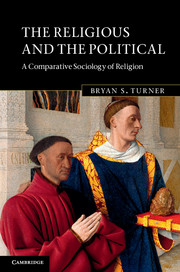Book contents
- Frontmatter
- Contents
- Acknowledgements
- Introduction
- Part I The religious and the political
- Part II State management of religion
- 4 Religion and kingship: liturgies and royal rituals
- 5 Religion and reproduction: marriage and family
- 6 Conversion and the state
- 7 Religion, state and legitimacy: three dimensions of authority
- Part III Comparative and historical studies
- Part IV Conclusion
- References
- Index
6 - Conversion and the state
Published online by Cambridge University Press: 05 April 2013
- Frontmatter
- Contents
- Acknowledgements
- Introduction
- Part I The religious and the political
- Part II State management of religion
- 4 Religion and kingship: liturgies and royal rituals
- 5 Religion and reproduction: marriage and family
- 6 Conversion and the state
- 7 Religion, state and legitimacy: three dimensions of authority
- Part III Comparative and historical studies
- Part IV Conclusion
- References
- Index
Summary
Introduction: collective identities
From a common-sense perspective it may sound paradoxical that, while conversion, at least in the Protestant tradition, involves a profoundly private turning to a personal God, it comes under regular public scrutiny, especially where conversion movements threaten to disrupt the social balance between majorities and minorities. Conversion concerns the transformation of individuals and their identities, but it also typically involves an important change in membership of a community. Because religion is often constitutive of national identity, a change of religious identity can have important implications for national character. In this sense, conversions may be disruptive, especially when they occur systematically to social groups rather than apparently at random to individuals. Conversion is not just the experience of an isolated individual; it can also involve the transformation of the status and identity of whole communities. For these reasons the state may often intervene to quash evangelical movements that seek to convert citizens to a new religion, or to some reformed version of an existing religious tradition. Such conversion movements may threaten to disturb the balance of populations in societies that are diverse rather than homogeneous. Furthermore, when evangelism is perceived to be associated with colonial powers, conversion can also be interpreted as a cultural threat to an indigenous community from a colonial power. The religious response from a local community to such invasions can be violent, setting off an aggressive religious competition resulting in a civil conflict.
We can consequently see why conversion is important socially and politically. First, in changing individual subjectivity conversion almost inevitably changes social and political identities, and therefore conversion movements can often represent a challenge to the cultural definition of membership and to the criteria of inclusion in society and the state. In many societies, such as the Philippines, Poland, Malaysia and perhaps increasingly Russia, religious membership is more or less equivalent to citizenship, especially where state institutions are weak or corrupt. Many states in Asia and Africa cannot provide adequate and reliable documentation of their own citizens, and hence identities as national citizens are typically unstable and uncertain.
- Type
- Chapter
- Information
- The Religious and the PoliticalA Comparative Sociology of Religion, pp. 119 - 134Publisher: Cambridge University PressPrint publication year: 2013



